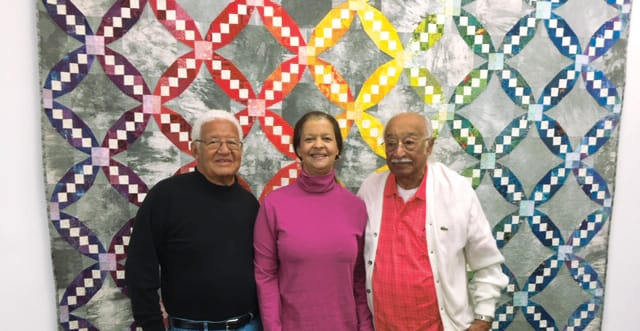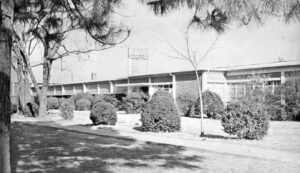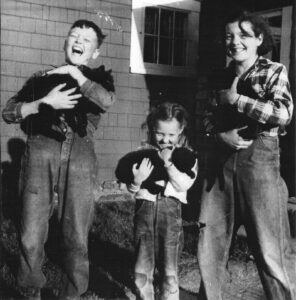Bill McGhee, 83, smiles as he reminisces about his childhood days in Aiken. “In the 1940s the alley was a playground for us. Bobby Brooks, whose family owned Jackson Brooks Funeral Home [now located on Fairfield Street with a second location in New Ellenton], and I were best friends and we loved to play marbles there.” He describes the shooters, the large metal marbles they called steelies, and all the different colors they collected. “The alley was ideal for playing marbles because it was dirt,” he says, adding, “Later on, when I moved to Philadelphia, I missed playing marbles. You can’t play marbles on pavement because they just keep going.”
“My grandfather, Alfred Thompson, had his blacksmith shop in the alley. He made shoes for the horses and also made wheels and other things out of metal,” recalls Clarence Smith, 88. “I remember as a kid we’d help by turning the handle on the forge, and he’d give us a nickel,” he adds with a smile. Clarence also talks about playing marbles and hide and seek in the alley. Growing up on Edgefield Avenue, he often played with the Kaplan children who lived across the street. Both Bill and Clarence note that a lot of Jewish families lived in town and many were also merchants.
Bill recalls that in addition to the funeral home, which was on the site that is now Betsy’s Around the Corner, and the blacksmith shop, Charlie’s Fish Market was also a black-owned business in the alley. He believes both the fish market and the blacksmith shop dated back to 1904. Clarence mentions Mr. Brown’s shoe shop as another black business in the alley. “It was next to the police station. He made shoes and did lot of repairs and heel replacements,” he says. “There were a lot more businesses on what is now Laurens Street,” he says.
Bill’s family moved to Philadelphia when he was six or seven, but he came back to spend summers in Aiken throughout his childhood. He explains that this migration to the North, yet sending children back in the summers was very common. “Most black families did this during that era,” he explains. “Everyone in Philadelphia used to ask me why I wanted to go back down there way out in the country. They thought it was desolate, like we didn’t even have running water,” he laughs. Bill enjoyed coming back to Aiken each summer through the 1960s, but recalls, “It was very segregated back then.”
Clarence remembers, “There was a white swimming pool in front of Warneke’s Cleaners when I was a boy. But they closed it when integration came in because they didn’t want any black kids swimming there.” The pool was filled in to make a parking lot, which remains today.
Much of Bill’s knowledge of life for black families in Aiken came from his mother. A great oral historian, she passed in 2018 at the age of 107.
While much younger, Robin Brooks, daughter of Bill’s friend Bobby, also learned about the impact of black proprietorships in Aiken from her family. “My father wanted me to know all the history of the business and that included hearing about other businesses at the time,” she explains.
Her father also told Robin about going to school in Aiken as young black children. Clarence and Robin’s dad went to Schofield School together. A Quaker from Pennsylvania, Martha Schofield, founded the school specifically for black children in 1871. Clarence graduated in 1949. “It was the first year that we had to go through 12th grade,” he says. “I know because my brother graduated in 1947 and it was only through 11th grade then. I had to go another year!” he chuckles. He also remembers that at Schofield, as well as at the black elementary school known as Aiken Graded School, “We used to get books from the white school. As they were throwing them away, they gave them to us,” he says.
According to Bill, many of the black-owned businesses in Aiken were originally there to serve the winter colonists. Bill’s grandfather, along with his cousin, founded a construction company, McGhee & McGhee, that did a lot of building work for those part-time residents. They built the Fermata Club in the early 1920s as well as the first hospital. Today, Bill heads up McGhee & McGhee, focusing on restoration construction. Soon they will be starting an extensive restoration of the historic club his grandfather built nearly 100 years ago!
Jason Smith, Clarence’s father, worked on building the iconic “Wavy Wall.” Bill believes it was in the late 1920s or early 1930s as it was his father who had the contract to build the structure. “The property was owned by a winter colonist who got the idea from something she had seen up north,” Clarence says.
In that same era, Bill’s other grandfather and his uncle owned a drugstore, C.C. Johnson’s, at the corner of Newberry and Richland. According to Bill, there was a transition around the early 1950s. “Most black business moved downtown, near the train depot.” His grandfather and uncle moved their drugstore downtown as well. “We stopped going uptown except to buy clothes, do banking, or go to the post office,” he recalls adding, “When Jim Crow came in, it ruined a lot of black proprietorships.”
Robin relays a funny story that had been passed down to her. For as long back as anyone could remember, the funeral home has given local churches small hand-held wooden fans to be used during the summer. They had the name Jackson Brooks Funeral Home printed on them, but at one point, they decided to print on the back of the fan as well. In an apparent attempt to warn people about the dangers of drinking moonshine, they added a comical drawing of a man with his tongue hanging out holding onto a jug marked “XXX”.
Bill and Clarence agree that they enjoyed their childhoods in Aiken. “It was a good life growing up,” says Bill, adding, “There were small family groups with a lot of connections.” Clarence notes that some things they just accepted as blacks at that time. “Like we couldn’t go to the University of South Carolina, we had to go to the South Carolina State.”

























